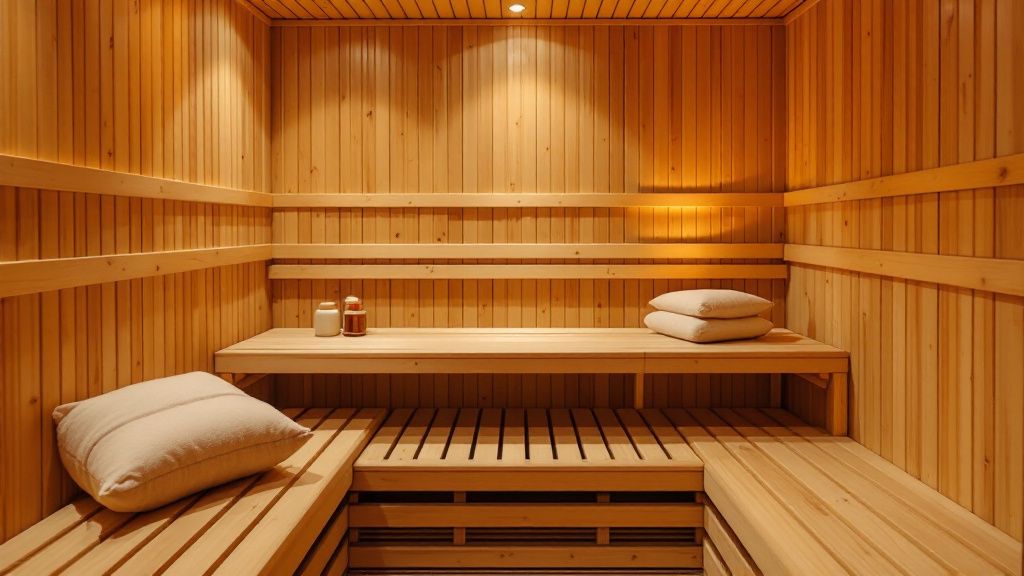Imagine stepping into the warm embrace of a sauna, where the gentle heat wraps around you, providing a serene escape from the chaos of daily life. As you relax in the soothing environment, your body begins its natural process of stress reduction. Saunas offer a wealth of health benefits, including promoting cardiovascular health and helping in relaxation. The warmth may play a role in lowering cortisol levels, a key hormone linked to stress. Engaging in these stress relief techniques can enhance your overall well-being, offering a holistic path to finding tranquility amidst life's demands. Through regular use, saunas might contribute to cortisol reduction, making them a popular choice for those seeking relaxation.
Understanding Cortisol and Its Effects on the Body
Cortisol, often dubbed the "stress hormone", plays a critical role in various bodily functions, particularly in response to stress. Produced by your adrenal glands, it helps regulate metabolism, suppress inflammation, and control your sleep-wake cycle. When faced with stress, your body boosts cortisol production, preparing you to face or flee from danger — the quintessential fight-or-flight response. While essential in moderation, prolonged high levels can lead to numerous health issues, from immune system suppression to weight gain.
Many advocate sauna use for inducing relaxation and potentially lowering cortisol levels. However, some suggest saunas may not significantly impact hormone levels like cortisol as claimed. The warmth of a sauna might simply foster a sense of calm that indirectly contributes to stress relief techniques. Yet, consistent sauna practice might still be allied with positive mental health outcomes and perceived stress reductions, even if the physiological changes aren't as marked.
You may be interested to explore this further, particularly considering the sauna health benefits that emphasize cardiovascular improvements and muscle relaxation. Regular sauna usage shares similarities with other stress relief methods, like meditation and yoga, often reported to contribute to overall wellness. While research on direct cortisol reduction from saunas remains evolving, the holistic benefits of this practice are often deemed worthwhile.

The Science Behind Sauna Therapy
Numerous studies have explored sauna therapy, revealing how exposure to high temperatures can positively influence your body’s functioning. When you relax in the warm embrace of a sauna, your heart rate increases, mimicking the effects of moderate exercise. This heat exposure boosts circulation, which may enhance muscle recovery and alleviate pain. Additionally, the raised body temperature promotes relaxation, underscoring why many consider saunas a beneficial stress relief technique.
Delving deeper, the impact of heat on the body's hormonal balance presents fascinating insights. Some researchers suggest that sauna exposure can lead to increased beta-endorphin levels, contributing to feelings of well-being. A widely discussed benefit is the potential for sauna sessions to aid in cortisol reduction, although findings on precise hormonal changes remain varied. This interplay between heat and hormone levels is crucial to understanding sauna health benefits.
Considering sauna therapy through the lens of its thermoregulatory effects offers a unique perspective. Saunas challenge your body's ability to maintain a stable internal temperature, leading to beneficial cardiovascular responses and detoxification processes. This perspective underscores why saunas remain popular in global wellness practices. Thus, incorporating saunas into your routine might enhance overall health and provide a holistic approach to managing stress.

Research Linking Saunas to Cortisol Reduction
Several studies have investigated the link between sauna use and cortisol reduction, highlighting intriguing possibilities. Within these controlled environments, participants generally experience a decrease in stress hormones following sauna sessions. For instance, research suggests that the heat from saunas might contribute to altering cortisol levels, promoting relaxation and, indirectly, stress relief techniques. Although results vary, such findings signify a potential avenue for further exploration into sauna health benefits.
To truly grasp the potential of saunas in the realm of cortisol reduction, you need to shift your mindset from merely viewing them as relaxation spaces to recognizing their possible physiological benefits. This perspective invites a broader consideration of how regular sauna use may play a role in long-term stress management. As scientists continue to delve deeper, the holistic implications become clearer, encouraging further personal exploration.
While not all findings are conclusive, the general consensus points towards saunas providing a favorable environment for mental relaxation. Many users report feeling a sense of well-being post-session, which may, on some level, relate to shifts in cortisol levels. Researchers continue to examine these elements, aiming to unlock more about how heat exposure in sauna settings impacts hormonal responses over time.
Incorporating Saunas Into Your Wellness Routine
Integrating saunas into your wellness routine offers a pathway to rejuvenation that combines relaxation and health benefits. To begin, consider starting with short sessions of around 10-15 minutes, gradually increasing your time as your body adapts to the heat. Incorporating saunas regularly could support your goals for stress relief techniques and contribute to a balanced approach to overall wellness.
Looking ahead, sauna use is expected to evolve with advancements in technology and increased understanding of its benefits. Innovations such as infrared saunas offer a modern twist on traditional practices, potentially making saunas more accessible and tailored to individual needs. Future trends might also focus on enhancing the health benefits associated with regular sauna use, particularly in stress management and cortisol reduction.
Creating a sauna routine that complements your lifestyle might involve harmonizing it with other wellness practices, like meditation or yoga. By surrounding yourself with holistic health strategies, the likelihood of achieving meaningful stress relief increases. As saunas become more ingrained in modern wellness, you may find incorporating them into your life an exciting opportunity to explore diverse health benefits and foster relaxation.
Conclusion Embracing Saunas for Lower Cortisol Levels
Exploring the role of saunas in reducing stress and potentially lowering cortisol levels takes you on a journey into the heart of holistic health practices. The gentle warmth of a sauna provides a refuge where you can unwind—a natural method for embracing relaxation and stress relief techniques. As you incorporate sauna sessions into your routine, the promise of cortisol reduction becomes an enticing possibility deserving of exploration.
Comparing sauna therapy to traditional relaxation methods, such as meditation or deep breathing exercises, reveals unique advantages. While both approaches aim to reduce stress, saunas add a physical dimension through heat exposure that can evoke immediate comforting responses. This comparative analysis highlights how saunas can serve as a complementary addition to existing stress management practices, offering a multifaceted approach to wellness.
The sauna’s ability to lower perceived stress levels and contribute to a sense of well-being is compelling, encouraging further integration into your daily life. Embracing this practice might enrich your health strategy, fusing relaxation with a host of potential sauna health benefits. As more people discover the merits of sauna use, its place in contemporary wellness routines continues to expand, inviting you to harness its potential for stress relief and enhanced vitality.

